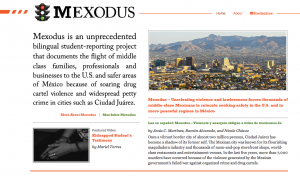Projects on U.S.-Mexico border, development in Brazil win Online Journalism Awards
|
By Alejandro Martínez
A student project that explored the migratory effects caused by drug violence along the U.S.-Mexico border and a comprehensive reporting package on the ongoing development of Paraná state in Brazil won the Online News Association’s 2012 awards for non-English projects during the ONA’s latest conference in San Francisco. “Mexodus,” published by Borderzine, a bilingual student publication of the University of Texas in El Paso, aimed to document the flight of families and businesses from Ciudad Juárez, Mexico to its sister city of El Paso, Texas. The mass migration followed a surge in drug violence and petty crime in the Mexican border city. Students from four universities in Mexico and the U.S. contributed to the nine-month project and published around 20 stories in both Spanish and English. “Retratos Paraná,” published by the Curitiba-based daily Gazeta de Povo was a four-month project in which a team of journalists traveled across more than 6,200 miles in the Brazilian southern state of Paraná to paint a detailed picture of the developing region.
